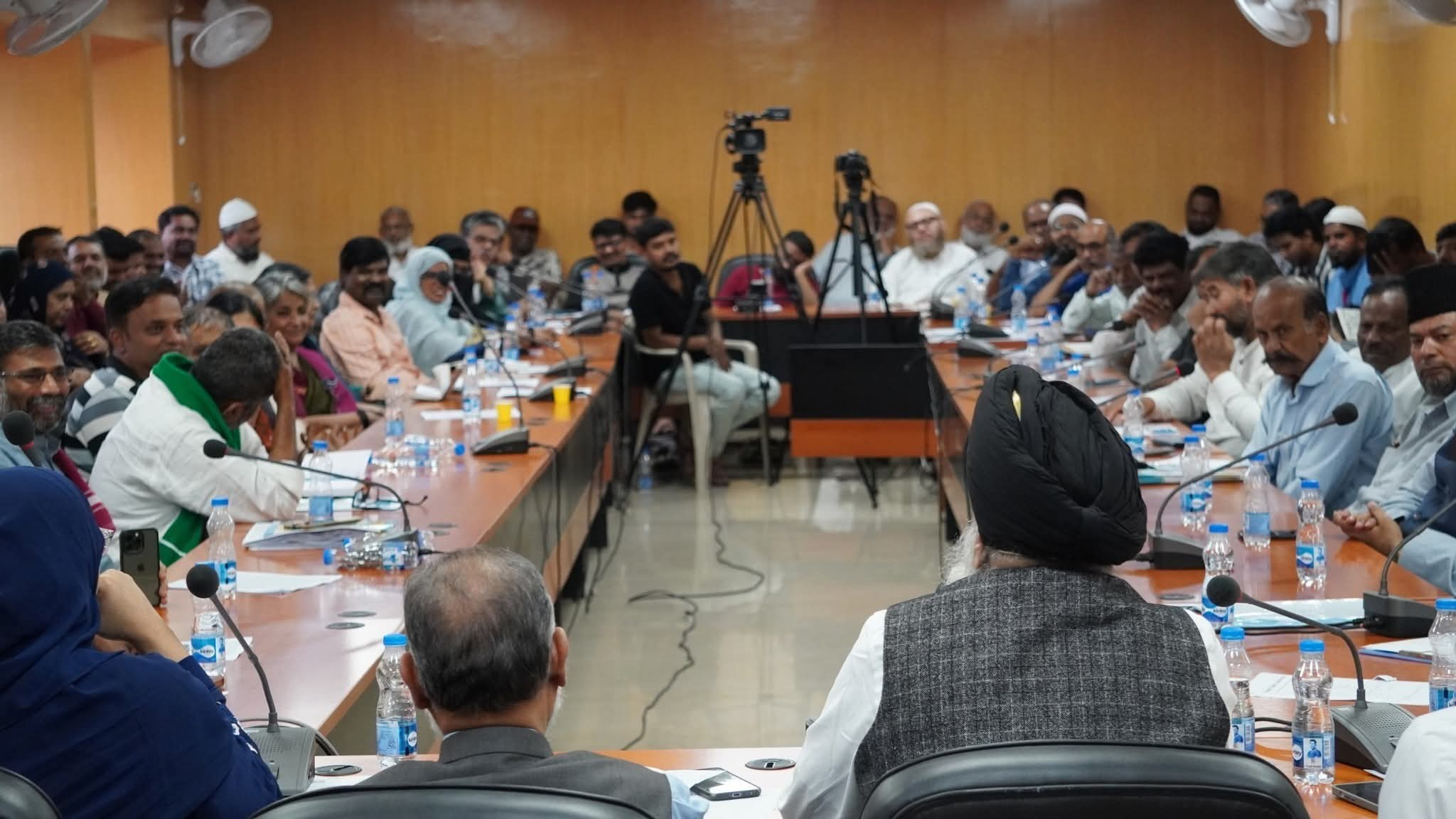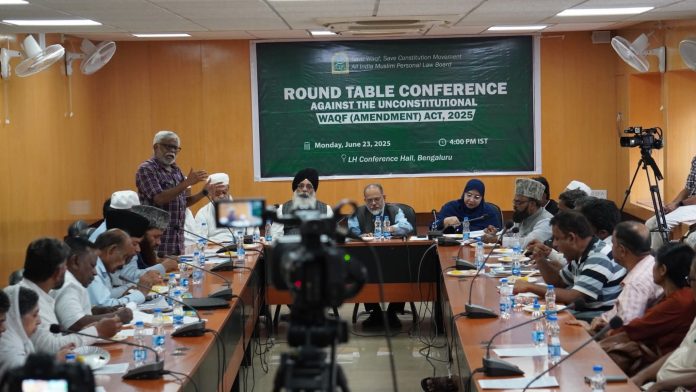– Mohammed Talha
Bengaluru: In a historic Round Table Conference held at the Legislative Hall of Vidhana Soudha here Monday, religious leaders and civil society organisations across faiths came together to strongly oppose the controversial Waqf (Amendment) Act 2025. Organised by the All India Muslim Personal Law Board (AIMPLB) under the nationwide campaign Waqf Bachao, Samvidhan Bachao (Save Waqf, Save Constitution), the event marked a watershed moment in interfaith collaboration and civic unity.
The gathering brought together over 85 organisations, including prominent Hindu seers, Christian pastors, Sikh granthis, Buddhist monks, Jain elders, Muslim scholars, lawyers, academics, and human rights activists. Participants unanimously declared the Act a violation of constitutional principles, religious freedom, and minority rights.
 Each community leader expressed solidarity with the AIMPLB in their struggle to protect Muslim endowments and uphold constitutional values. Their endorsement of the Waqf Bachao, Samvidhan Bachao Andolan is being widely seen as a major achievement for AIMPLB — effectively bringing concerned citizens, faith groups, and activists onto a single platform to defend secularism and civil rights.
Each community leader expressed solidarity with the AIMPLB in their struggle to protect Muslim endowments and uphold constitutional values. Their endorsement of the Waqf Bachao, Samvidhan Bachao Andolan is being widely seen as a major achievement for AIMPLB — effectively bringing concerned citizens, faith groups, and activists onto a single platform to defend secularism and civil rights.
Joint Declaration from Religious and Civil Society Leaders
At the close of the conference, participants issued a 10-point declaration, listing the specific ways in which the amendment violates constitutional safeguards and discriminates against the Muslim community. Highlights include:
- The amendments passed by Parliament are not only discriminatory but directly contradict the Constitution of India.
- They violate Fundamental Rights enshrined in Articles 14, 25, 26, 29, and 30.
- Muslim Waqf properties are stripped of protections that remain intact for endowments belonging to Hindus, Sikhs, Christians, and Buddhists.
- The amendments infringe on Muslims’ rights to religious freedom and to manage their own institutions.
- A Muslim can no longer create Waqf from personal property if he is not a “practicing Muslim” for five years.
- In disputes over Waqf land, government-appointed officials — not courts — will now decide ownership.
- The mandatory Muslim identity requirement for Waqf Board membership is removed, and democratic elections are replaced by political nominations.
- Waqf properties must now be registered under “Waqf by User” or risk losing their protected status.
- Tribal Muslims are denied the right to dedicate personal property as Waqf.
- The Waqf Act 2025 obstructs Muslims’ constitutional right to establish and manage their religious and charitable institutions.
The declaration called on the government to immediately withdraw the law and suspend its implementation until the Supreme Court delivers a final verdict on the pending legal challenges.
Legal Experts Sound Alarm on Constitutional Breach
AIMPLB Secretary Advocate M.R. Shamshad, in a detailed presentation, emphasised that the Act violates both Supreme Court rulings and the spirit of Article 26.
“Waqf is not a government asset. It is a perpetual religious trust for public good. This amendment is about control, not reform,” he said.
The conference highlighted how the law targets Muslim institutions while sparing similar trusts of other communities, raising serious questions about equality before the law.
National Civil Rights Movement Expands
The Round Table Conference is being recognised as a strategic expansion of the Waqf Bachao movement into a broader civil rights initiative. Leaders across religions saw this as not just a defence of Muslim rights, but a larger struggle to preserve India’s pluralist democracy.
In a united voice, all attendees pledged to stand by AIMPLB in its legal and democratic resistance. The Board announced plans to replicate such conferences across India, galvanising multi-faith support to resist authoritarian overreach and protect constitutional freedoms.
The attendees included Dr. Mohammed Saad Belgami (Ameer, Jamaat-e-Islami Hind Karnataka), Adv. M.R. Shamshad (Secretary, AIMPLB), Mufti Iftekhar Qasmi (Principal, Sabeel-ur-Rashad Seminary), Maulana Abu al-Qasim (City Jama Masjid, Bengaluru), Maulana Azizur Rahman (Darul Uloom Shah Waliullah), Dr. Afroz Begum (Former Gen. Secretary, Ulama Council), Prof. Abdul Hameed (Former Principal, Srinagar College), Rahul Leader (Christian Secular Forum), representatives of Sikh, Buddhist, and Jain communities as well as legal experts, women’s groups, students, and social activists.
The event concluded with the unanimous adoption of the joint resolution and a collective pledge to uphold the Constitution, protect minority rights, and confront injustice through peaceful democratic means.
“This is not merely about property; it’s about the soul of India’s democracy,” the resolution concluded.




